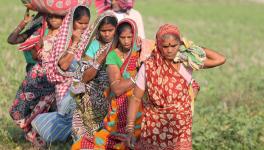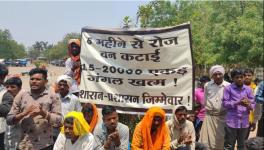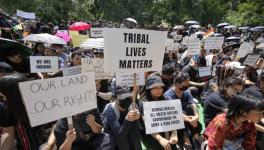Chhattisgarh: Silger Protests Continue, Increase in Violence Hinder Access to Justice
Image Courtesy: The Week
As protests against increased military footprint in Chhattisgarh’s Silger area continue to rage after three months of their initiation, increasing instances of violence have surfaced. Meanwhile, lawyers claim that access to legal justice continues to elude the tribal community of the region.
In the latest instance on July 15, three men were reportedly gunned down in the region of Pedapal by the team of District Reserve Guards (DRG). While the forces claim that they were members of the outlawed Communist Party of India (Maoist), local testimonies and lawyers are highlighting that the men were innocent and had ventured out to buy cattle.
Speaking with NewsClick, lawyer Bela Bhatia explained, “The movement in Silger has been rooted in the opposition to militarisation of the region which leads to violence against the community. And, there has been an increase in violence this year – which makes access to justice and basic rights such as filing complaints difficult.”
She further added, “We have been able to file complaints on the behalf of the wives of those who were killed in an encounter with great difficulty, with the police refusing to admit our complaint.”
Testimonies of residents reveal that the men had gone to Nilbaya to buy two cows. As evening approached, the men were having a meal at a house when they were surrounded by the DRG forces. The villagers state that they were dragged out with ropes and shot dead.
Commenting on such incidents, Inspector General of Police (Bastar range) Sundarraj P told NewsClick, “The aim of these camps is to clear out the naxal footprint and pave way for developmental activities. We have so far recovered 26 bodies of naxals this year from January onwards.”
No mechanism for redressal
As instances of encounters and judicial killings prevail in the region – access to legal recourse eludes the communities. The report of the magisterial inquiry on the killing of three more people from Silger in May during the protests has not yet resulted in a report.
Bela Bhatia said that even though these are routine procedures as claimed, the results, however, are not made public. She said, “Law has to be in service of the people and the situation on the ground is that scores of such cases are emerging. However, the basic complaints of the victims have not been taken in. Only when the complaints are taken in will they translate into FIRs which is yet again only the first step in the access to legal justice, the complaint is not an end in itself.”
Also read: Chhattisgarh: Tribal Protests Against Security Camps Continue; Rights Activists Meet CM
Registering complaints and FIRs remains a task given the fact that the police file their own complaints on their versions of things, according to her. She added, “This leads to the creation of a counter FIR. As per case law, there have been a few instances of this kind. Allahabad High Court had said that if interpretation of facts are perceived differently by different parties then there is a possibility of a second FIR.”
Given these glaring loopholes, the Silger movement in its third month is now taking the shape of an all encompassing movement for the rights of the communities and legal justice. As it continues on the ground – support pours in everyday to stall the expansion of camps across the state.
Media reports state that in the last two years, 28 security camps have been established in Bastar. Scroll.in reported that Bastar Police, under its policy of ‘Vishwas, Vikas aur Suraksha’, or ‘trust, development and security’, established 14 new security camps in 2020 – one in Narayanpur, two each in Kanker and Sukma, three each in Bastar, Dantewada and Bijapur districts.
The camps have been seen as tools of repression by the community – those yielding to increased instances of violence in the state. Tribals in the state have been conducting sustained protests against the infiltration of more forces, saying that the increased presence leads to brutal repression.
On May 12, security forces set up their latest camp in Silger village in Sukma district, despite stiff opposition from the locals. The opening of the camp had led to widespread protests in the region, also spreading to other villages. However, on May 17 security forces opened fire on a gathering of about 3,000 tribals, killing three. While the police forces claim they were targeting naxals in a crossfire, tribal villagers have been asserting that the unprecedented move was aimed at dispersing the crowds and suppressing their movement.
Also read: Fact-Finding Report Confirms Three Deaths of Adivasi Protesters in Silger Firing
Over 43 incidents of killings in 2021 have been reported due to conflict in the region. Tribal villagers on the ground hold that the presence of security camps have given rise to fears of fake encounters and oppression against tribal villagers.
On May 30, an 18-year-old tribal girl was reportedly gunned down by security forces in Bastar, Chhattisgarh. Her family has alleged that she was raped by the security forces before she was murdered by the District Reserve Guards (DRG) personnel.
As per the police version, the girl was an active member of the People’s Liberation Guerrilla Army, platoon number 16, and carried a reward of Rs 2 lakh, while her family members and villagers assert that was innocent and was not involved in Maoist activity. More importantly, they allege that she was denied a fair probe.
Villagers also fear that with proximity of security camps to tribal settlements, instances like these will become rampant.
In a similar case in February this year, a 20-year-old tribal woman – Pande Kawasi – was taken into custody after which she was allegedly murdered by the forces. The police, however, claim it was a case of suicide. But, her family members and activists have stated that Kawasi was not someone who would have killed herself. Her family reportedly stated that the police detained her from her home and allegedly tortured her and forced her to surrender. The family told reporters that they were allowed to meet her on February 20, and found her crying and begging them to take her home.
Get the latest reports & analysis with people's perspective on Protests, movements & deep analytical videos, discussions of the current affairs in your Telegram app. Subscribe to NewsClick's Telegram channel & get Real-Time updates on stories, as they get published on our website.
























